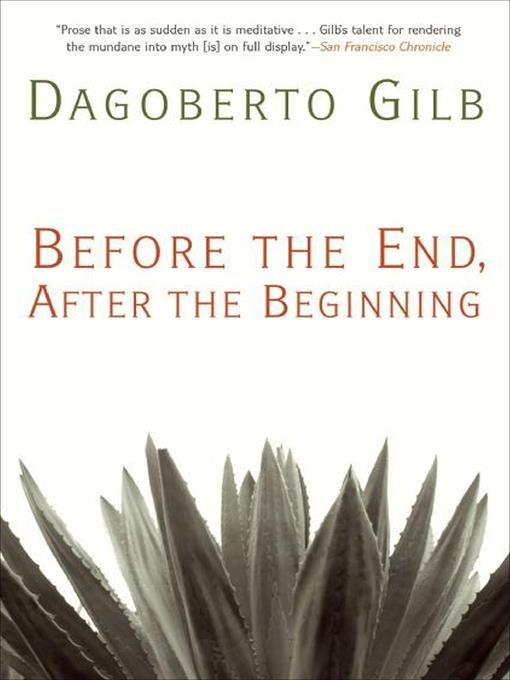
Before the End, After the Beginning
- اطلاعات
- نقد و بررسی
- دیدگاه کاربران
نقد و بررسی

August 15, 2011
PEN/Hemingway Award–winner Gilb’s 10 new tales, many written as the author recovered from a 2009 stroke, take on family ties, poverty, labor, and prejudice at the country’s borders, but defy racial and geographic boundaries even when they provide the principal conflict. In “Hacia Teotitlán,” a Mexican immigrant raised in L.A. struggles to resolve his dual identity; “Uncle Rock” finds an Americanized child trying to bond with his mother’s culturally naïve boyfriend. Financial divisions abound, as in “Willows Village,” where the shiftless Guillermo visits a wealthy relation, and the wonderful “Cheap,” the prescience of whose subjects—immigration policy and underpaid laborers—is rivaled only by the explicit address of Arizona’s immigration crackdown in “To Document.” And yet the most affecting story may be “please, thank you” for its depiction of a proud man recovering from a stroke and working his way back into language, as Gilb himself was forced to do. This new collection (after The Flowers) demonstrates that the author has more power than ever in addressing the conditions and contradictions of being split across cultures, and reminds us that every American, native or immigrant, is the product of a society that must learn to share or risk losing its founding graces.

October 1, 2011
Men struggle with old demons, attractive women and a persistent racism in the latest collection from Gilb (The Flowers, 2008, etc). It's a cliché to compare a short-story writer with a clean-cut prose style to Raymond Carver. But Gilb's stories do recall the minimalist master, and not just because of their trim sentences (or because Gilb knew Carver). Like Carver, Gilb focuses his stories on working-class men who are slowly awakening to their ineptitude at relationships, who have a hard time shaking off old addictions, and who can't quite move their careers out of neutral. What distinguishes Gilb is his deft handling of race: The heroes in these 10 sharp stories are mostly Mexican-American men who weather plenty of prejudice. "Cheap" exemplifies Gilb's interests, centering on a talented but ailing musician who uncomfortably referees a rift between two Latino painters in his home and their bullying, sanctimonious gringo boss. Manliness is a consistent theme, most strongly in "The Last Time I Saw Junior," in which an old friend intrudes on the narrator by dragging him back into the world of macho drug dealers. Yet these men are easily undone by a provocative woman or two. In "Willows Village," the best story of the batch, a down-on-his-luck family man moves in with his aunt, whose wealth and attractiveness unsettle him; Gilb skillfully generates erotic tension without making the story comic or perverse, and the ending underscores the connections between greed and lust. Gilb suffered a stroke in 2009, and the collection's opener, "please, thank you," seems to address that event, recalling the narrator's recovery and firmly establishing the key elements of his stories: family, prejudice and what's required to overcome a sense of helplessness. Gilb gets excellent mileage from simple elements. Though the men in these stories have common concerns, each feels distinct and alive.
(COPYRIGHT (2011) KIRKUS REVIEWS/NIELSEN BUSINESS MEDIA, INC. ALL RIGHTS RESERVED.)

August 1, 2011
The ten stories this collection comprises represent the latest output from an increasingly recognized Latino author. The most noteworthy piece by far is the first one, "please, thank you," written in lowercase because the narrator, suffering from the paralyzing effects of a stroke, cannot use the shift key. Writing while he was recovering from a stroke himself, Gilb here captures the frustration and helplessness of a patient capable of understanding but humiliated by his incapacitation. Except for "Uncle Rock" and "Willows Village," the remaining stories, which rely on the open if not ambiguous endings found in Gilb's earlier The Flowers, lack the vibrant originality of the opening story. Most of these stories fall into the category of narrative realism, drawing on the recognizable lives of working-class Latinos as well as the author's personal experience. VERDICT A heterogeneous assortment of true-to-life experiences focusing on Latinos in the American Southwest, but with enough relevance and literary merit to be of interest to the general public elsewhere, as well as to academia. [See Prepub Alert, 5/9/11.]--Lawrence Olszewski, OCLC Lib., OH
Copyright 2011 Library Journal, LLC Used with permission.

October 1, 2011
In PEN/Hemingway Awardwinning author Gilb's latest terrific offering, his short stories (some new, others previously published in such venues as the New Yorker and Harper's) are about, well, life. They are stories that resonate with all the workaday conflicts, and looking-for-work challenges, facing real people in today's world. There's the stroke victim in please, thank you who is working to regain his strength and independence. And the young Chicano in Willows Village, who is searching for a job so he can support his wife and child. In Cheap, a Mexican American musician deals with issues on both sides of the bigotry fence. To a person, they all face life as it is dealt to the commonly disenfranchised population of Mexicans and Mexican Americans in America's great Southwest. Times, they are not easy. But because Gilb's narration is lyrical, even magical; his dialogue so true; and his stories straight shooting, it is impossible for a reader to remain disengaged.(Reprinted with permission of Booklist, copyright 2011, American Library Association.)




دیدگاه کاربران